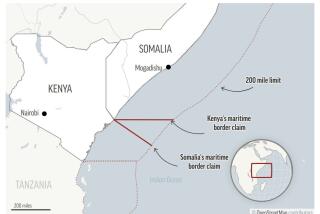Stormy seas off Somalia
- Share via
The killing of four Americans who were taken hostage aboard the yacht Quest off the coast of Oman serves as an ominous warning that pirate activity will increase in 2011 despite large-scale naval deployments in the Gulf of Aden.
The incident also underscores the limits of raw power. Those aboard the Quest, although surrounded by warships and tracked by a helicopter, still met a tragic end.
Indeed, intercepting a hijacked vessel is an anomaly. In most cases pirates can act with impunity because of the enormous area that naval patrols need to cover. Only rarely will the authorities be in the vicinity of a ship or yacht under attack.
Last year, there were 445 actual or attempted acts of piracy off the Horn of Africa, the highest total on record. This despite international countermeasures that include multilateral task forces — Combined Task Force 151, NATO’s Operation Ocean Shield and the European Union’s EU NAVFOR — as well as unilateral deployments that combined involve 28 countries. A world of patrols has not stopped piracy, nor kept it from constantly ratcheting up to 1,650 incidents since 2006.
Why not?
The main reason is a lack of effective governance in Somalia. Many pirate syndicates operating off the Horn of Africa trace their origin to coastal clan militias that formed following the collapse of the Siad Barre regime in Somalia. These gangs initially sought to prevent poaching of fish stocks and the illegal dumping of hazardous waste. But they soon evolved into criminal enterprises that intercepted and “taxed” any vessel transiting their self-defined territorial waters. That unruly legacy continues to pervade Somalia, which has no functioning central authority and no way of curtailing the activities of pirate syndicates.
Another reason piracy goes on is money. Last year Somali pirates coerced about $238 million in ransoms, with average payouts of $4 million to $5 million a ship, far more than the $150,000 median in 2005. In one notable example, pirates extorted a record $9.5 million for the release of a South Korean supertanker, the Samaho Dream. These sums are huge anywhere, but especially in a country where most people live on less than $2 a day.
For its part, the shipping industry settles with pirates as quickly as possible. Owner-operators reason that even million-dollar payouts are cheaper than losing a vessel and its manifest. They know that the longer negotiations drag on, the longer their vessels will be out of commission and not making money.
Nor are ship owners willing to opt for safer routes that bypass the pirate-infested region. Alternative passages around the Cape of Good Hope could add three weeks to an average voyage. With unrest in Libya already causing increases in oil prices, shippers are even less inclined to contemplate trips that impose higher fuel costs, an economic burden that would be passed on to consumers.
It’s not surprising, then, that the shipping industry has shunned endeavors to make paying ransoms illegal, though it would reduce the incentive for piracy. Shippers’ resolve will doubtless be hardened after a British appeals court ruled in January that ransoms does not run counter to the interests of British policy and that the sums paid are recoverable as a business expense.
So the pirates win, and many shippers continue to play the odds. The risk of a hijacking in the Gulf of Aden is still only about 0.5% when measured against the number of transits.
If other individuals like those on the Quest lose their lives and the situation around the Gulf of Aden deteriorates, there will be pressure to upgrade and expand the naval dragnet. However, such measures address piracy only at its end point, on the sea, rather than at its root, on land.
Adm. Robert Willard, head of the U.S. Pacific Command, acknowledged as much this month. “I don’t think you’re ever going to defeat this threat at the far extremes of their operations on the sea lanes,” he said. “Rather, you have to go the centers of gravity — the source on land in the Horn of Africa — and put a stop to it there.”
Only by addressing the poverty and lack of central authority in Somalia can the international community lower maritime crime and violence off the Horn of Africa. Defaulting to a naval containment strategy that has so far failed to deliver is not the answer.
Peter Chalk, the author of “The Maritime Dimension of International Security: Terrorism, Piracy, and Challenges for the United States,” is a senior analyst at Rand Corp.
More to Read
A cure for the common opinion
Get thought-provoking perspectives with our weekly newsletter.
You may occasionally receive promotional content from the Los Angeles Times.









